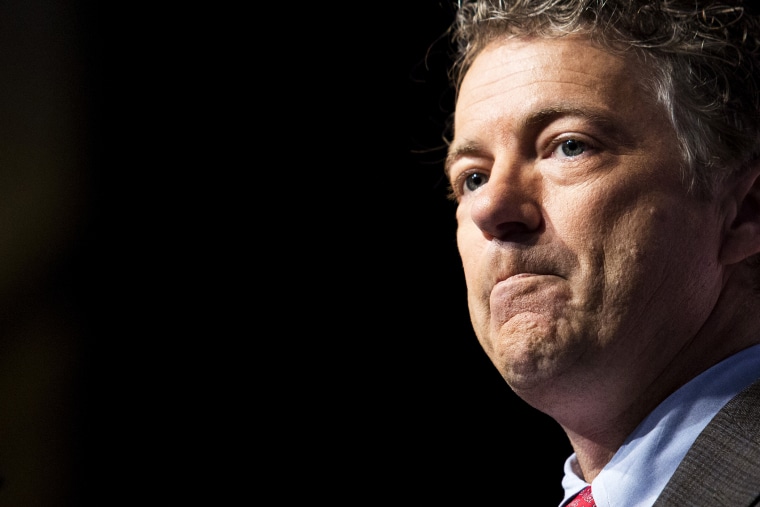Kentucky Republican Sen. Rand Paul came out in favor of ending America's longstanding prohibition on trade and travel with communist Cuba on Thursday, a bold move that pits him against several GOP presidential prospects who have condemned the United States' landmark deal with the island in strong terms.
"The 50-year embargo just hasn't worked," Paul said in an interview with radio station WVHU. "If the goal is regime change, it sure doesn't seem to be working and probably it punishes the people more than the regime because the regime can blame the embargo for hardship."
RELATED: Obama moves to restore relations with Cuba
Paul, who is weighing a presidential run in 2016, had not previously taken a decisive position on Cuba before President Obama's surprise announcement on Wednesday that the United States would seek to normalize relations after pursuing a strategy of isolation for more than five decades. His father, former Rep. Ron Paul, came out against the embargo in his 2008 and 2012 presidential campaigns.
"In the end, I think opening up Cuba is probably a good idea," Rand Paul said on Thursday.
Paul's position pits him against every top Republican presidential prospect to weigh in so far, but it's not entirely unexpected either. The libertarian senator has played a maverick role within the party on a variety of issues, none more eagerly than foreign affairs, where he favors a less confrontational approach to U.S. policy. While Paul has moved closer to the GOP's center than his father did in his own presidential campaigns, he has made clear in recent speeches that he plans to challenge the party's traditionally hawkish consensus from the left if he runs.
Florida Sen. Marco Rubio, a son of Cuban immigrants, is a longtime advocate of a hardline stance against the Castro regime and launched a one-man media blitz on Wednesday criticizing Obama's decision in the harshest terms.
“It is just another concession to a tyrant by the Obama administration rather than a defense of every universal and inalienable right that our country was founded on and stands for,” Rubio said in a press conference responding to Obama's own televised announcement.
Former Florida Gov. Jeb Bush, a solid embargo supporter with ties to the state's Cuban community, also slammed the move in a statement, saying it "undermines America’s credibility and undermines the quest for a free and democratic Cuba." Texas Sen. Ted Cruz, whose father emigrated from Cuba, said in a statement Wednesday that normalization hands the Castro regime “both international legitimacy and a badly-needed economic lifeline from President Obama.” Former Arkansas Gov. Mike Huckaee and current Louisiana Gov. Bobby Jindal, both potential Republican presidential candidates, took similar positions.
RELATED: Major Cuba move is a 2016 bombshell
Paul's decision puts him in the same camp as Democratic frontrunner Hillary Clinton, who recounted in her book "Hard Choices" advising Obama to revisit Cuban relations as Secretary of State and released a statement reiterating her support for the idea on Wednesday.
In terms of presidential politics, the presence of two Florida heavyweights in the prospective 2016 pool -- Bush and Rubio -- may actually make it easier for Paul to buck the party consensus. Conservative Cuban voters, whose outrage Rubio and Bush channeled on Wednesday, are a significant voting bloc in Florida's important GOP primary contest. But it's possible Paul won't contest the state anyway if Bush or Rubio run, as he and other candidates might assume they can't overcome their home field advantage and focus resources on other states instead.
Should Paul make it to the general election, it's not clear how much of a political backlash either he or Clinton would face for their position. National and state polls, including those of only Cuban voters, have shown majority support for normalization as memories of the Cold War fade.
"This move will have a negligible effect on the 2016 elections, even in Florida, where the majority of Hispanic voters are non-Cuban and most of the Americans of Cuban descent were born in the U.S. and not as rabidly anti-Castro as their parents and grandparents," election analyst Charlie Cook told msnbc in an email.
